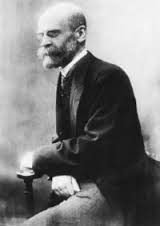Emile Durkheim (1858-1917) is widely regarded as the founder of sociology, and has been enormously influential on the entirety of the modern social sciences. The author of The Elementary Forms of the Religious Life, Suicide: A Study in Sociology, and The Division of Labor in Society among others, he is perhaps most well-known in Religious Studies for his definition of religion as
“a unified system of beliefs and practices relative to sacred things, that is to say set apart and forbidden, beliefs and practices which unite into one single moral community, called a church, all those who adhere to them” (1965 [1912]: 62).
Within this well-worn definition we can glimpse the basic foundations of an entire approach to the study of religion, which places emphasis upon the role of social interaction and discourse in ‘setting things apart’ – in constructing the ‘sacred’ and the ‘religious’- rather than assuming or advocating for an inherent, sui generis, religion.
In this wide ranging and in-depth interview with Chris, Ivan Strenski discusses Durkheim’s life and work in a broader context, tracing his impact through the ‘Durkheimian school’ – which includes Claude Levi-Strauss – and presenting an understanding of the academic study of religion as a Durkheimian project.
Podcast: Play in new window | Download | Embed
Subscribe: RSS
You can also download this interview, and subscribe to receive our weekly podcast, on iTunes. If you enjoyed it, please take a moment to rate us. And remember, you can use our Amazon.co.uk, Amazon.ca or Amazon.com links to support us at no additional cost when participating in the ‘sacralizing’ of the social and buying your Christmas presents etc.
This is the final episode in a series on early 20th century theorists of religion. The first featured Robert Segal on C. G. Jung and the second featured Paul-François Tremlett on Claude Levi-Strauss.










